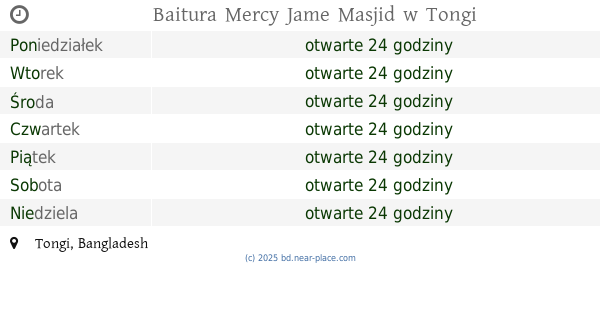otwarte
🕗 godziny otwarcia
| Poniedziałek | - | |||||
| Wtorek | - | |||||
| Środa | - | |||||
| Czwartek | - | |||||
| Piątek | - | |||||
| Sobota | - | |||||
| Niedziela | - | |||||
Dakshin Khan, Dhaka 1230, Bangladesh
kontakt telefon: +880 1818-304636
większa mapa i wskazówkiLatitude: 23.8556993, Longitude: 90.4165318






Md. Mafujul Islam
::Jama Masjid Jama Masjid (also spelled Jame Mosque, Jami Masjid, Jameh Mosque, Jamia Masjid or Jomeh Mosque) refers to the main mosque of a town, city or village, and is usually the place of gathering for Eid prayers and Friday prayers. These are sometimes called Congregational mosques or Friday mosques. Many places come to be known as a Jama Masjid as a proper name. For example Delhi jama masjid, Old Delhie. "Language and etymology" The term "Jama Masjid" means "Mosque of Assembly" or "Congregational Mosque" and comes from Arabic, Arabic: مسجد الجمعة. Although the word "Jama" means assembly or congregation, it has been conflated with the word for Friday, the primary day of worship in Islam, and hence, originally incorrectly, but still sometimes these are called Friday Mosques, after the Jumu'ah or weekly Friday noon congregation prayers of Muslims. In Persian, the term is Persian: مسجد جامع masjed(-e) jāme. Jameh (جامع) stems from the root word jám (جمع) meaning "gathering", as opposed to Jom'ah (جمعه) meaning "Friday". Salah ("worship", صلاة; pl. صلوات ṣalawāt; also salat), called namāz (Persian: نَماز) in some languages, is one of the Five Pillars in the faith of Islam and an obligatory religious duty for every Muslim. It is a physical, mental, and spiritual act of worship that is observed five times every day at prescribed times. When they do this, they must face Mecca. In this ritual, the worshiper starts standing, bows, prostrates themself, and concludes while sitting on the ground.[1] During each posture, the worshiper recites or reads certain verses, phrases and prayers. The word salah is commonly translated as "prayer" but this definition might be confusing. Muslims use the words "dua" or "supplication" when referring to the common definition of prayers which is "reverent petitions made to Allah". Salah is preceded by ritual ablution. Salah consists of the repetition of a unit called arakʿah (pl. rakaʿāt) consisting of prescribed actions and words. The number of obligatory (fard) rakaʿāt varies from two to four according to the time of day or other circumstances (such as Friday congregational worship, which has two rakats). Prayer is obligatory for all Muslims except those who are prepubescent, are menstruating, or are experiencing bleeding in the 40 days after childbirth.[2] Every movement in the salah is accompanied by the takbir except the standing between the ruku and sujud, and the ending which has a derivation of the Muslim greeting As-salamu alaykum.